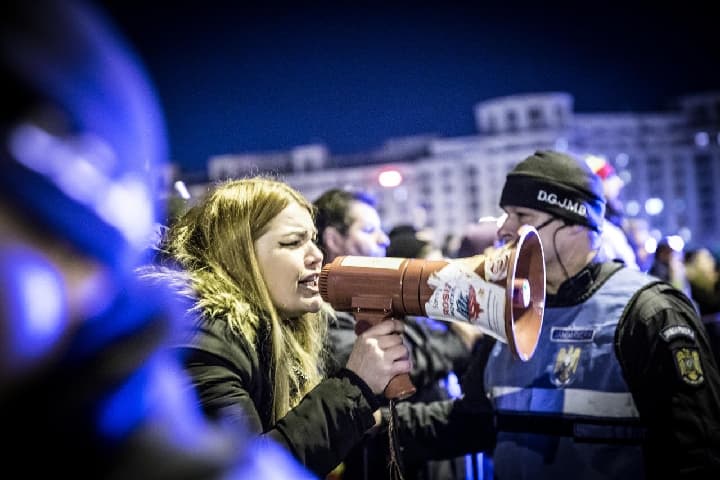Winter 2020
The Step-by-Step Revolution
– Cătălin Teniţă
Romanians took to the streets to make change at the ballot box. An inside account of how two years of peaceful protest won the day.
January 31st, 2017: The Night Before the Revolution
It is 9 p.m. I am in my new house in a Bucharest suburb, looking forward to reading as I take a long hot bath.
A friend texts me: "Turn on the TV!"
Two hours later, in subzero temperatures, 10,000 people show up to demonstrate against the government in the center of Bucharest. The numbers grow from there.
What moved them to come out on a freezing cold night?
It is a story that started with the landslide victory parliamentary elections by the PSD (or “Social Democratic Party”) in December 2016.
Romania’s media bubbled over with speculation about what the successor party to Romania’s Communists might do with its new mandate. There are rumors that the party – led by its chairman Liviu Dragnea, who is also president of Romania’s Chamber of Deputies – will try to rewrite the country’s penal code. The changes would aim to redefine political influence trafficking, and allow those being investigated for corruption to escape justice.
Dragnea is at the height of his political acumen in this moment. In December’s elections, he secured the highest score in the party’s history. Yet his 2014 conviction for electoral law violations prevents him from becoming prime minister. (Romanian law bans those who have suffered a criminal conviction from holding this office.)
So Dragnea and his party want to change the laws on holding office and on pardons. In the meantime, he appoints Sorin Grindeanu, a young politician with no public visibility until that moment, as prime minister, without even consulting his own party.
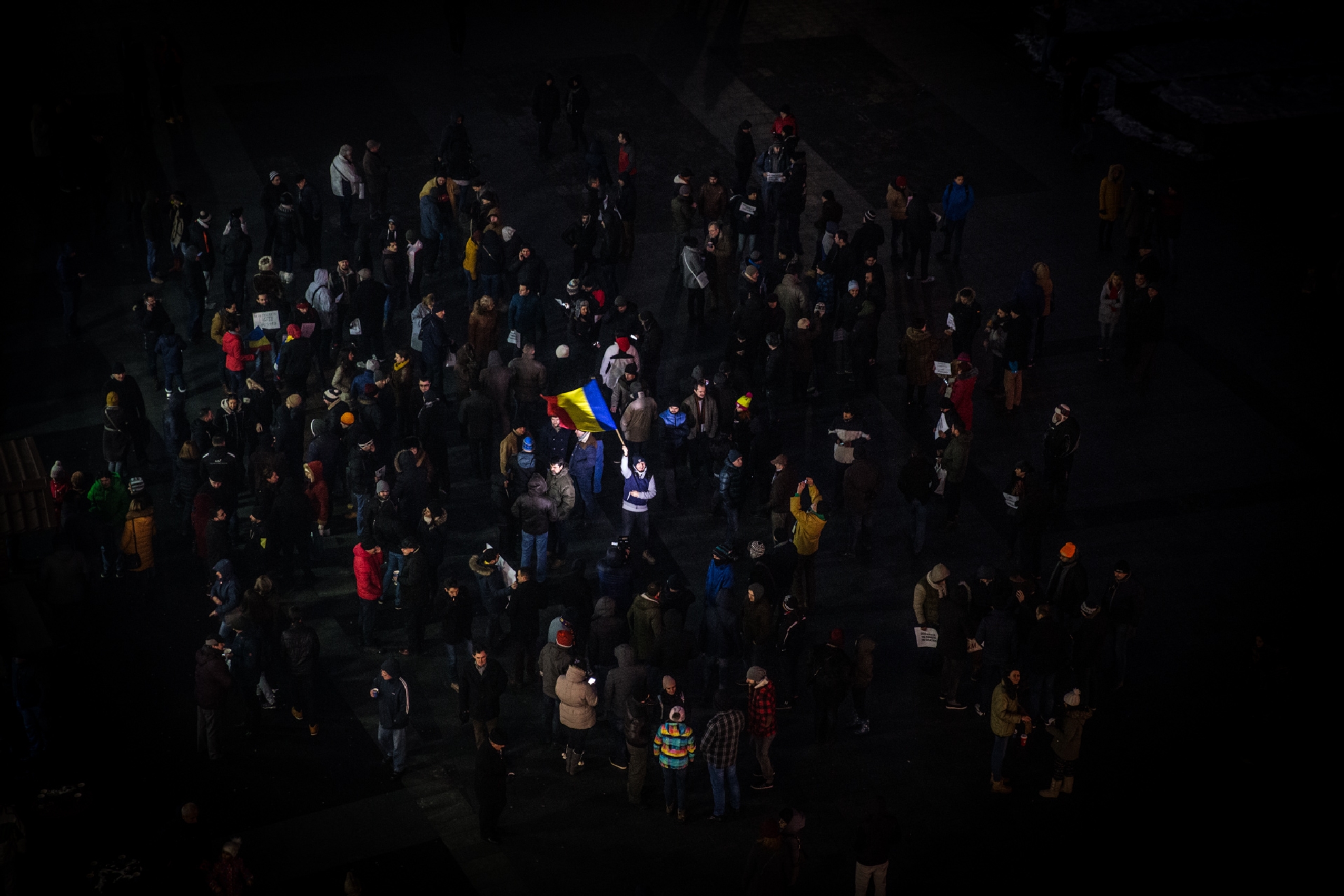
Protests against the measures started in January 2017. “Justice, not corruption!” is one of the slogans. Another cry is: “We don't want to be led by thieves!” Romania’s president, Klaus Iohannis (elected two years before on a pro-European platform) joined the protesters. TV stations aligned with the PSD attacked him, saying he is overstepping his constitutional prerogatives.
When the press reports that two emergency ordinances [on pardons and the penal code] will be promoted by Dragnea and the PSD without public consultation, Iohannis takes over a government meeting. He says: “There are two elephants in the room. The pardoning ordinance and the penal code ordinance.”
Grindeanu tries to avoid a frontal collision with Romania’s president. He officially denies the ordinances are being prepared. But Dragnea is angry. On January 31, 2017, he takes action.
“Justice, not corruption!” is one of the slogans. Another cry is: “We don't want to be led by thieves!”
That’s what I see when I turn on my TV. Romania’s Justice Minister, Florin Iordache, is presenting the PSD’s proposed changes as emergency ordinances at a press conference. As emergency measures, the new laws don't need approval from the Parliament to enter into force. They will stay in effect, even if they are later withdrawn. The most outrageous change is a provision that no unlawful act committed in an official capacity will be prosecuted as abuse of office unless it exceeds $50,000 in value.
The journalists are outraged, and pepper the minister with queries. Iordache deflects them with replies of “Another question!” At least 20 times.
At home, in front of their TVs, people feel like it is Orwell’s 1984 all over again. With no coordination, many of them decide to go to Bucharest’s Victory Square – where government offices are located. They post "See you in Victory Square. Let's go!" on Facebook, and leave their homes as quickly as possible.
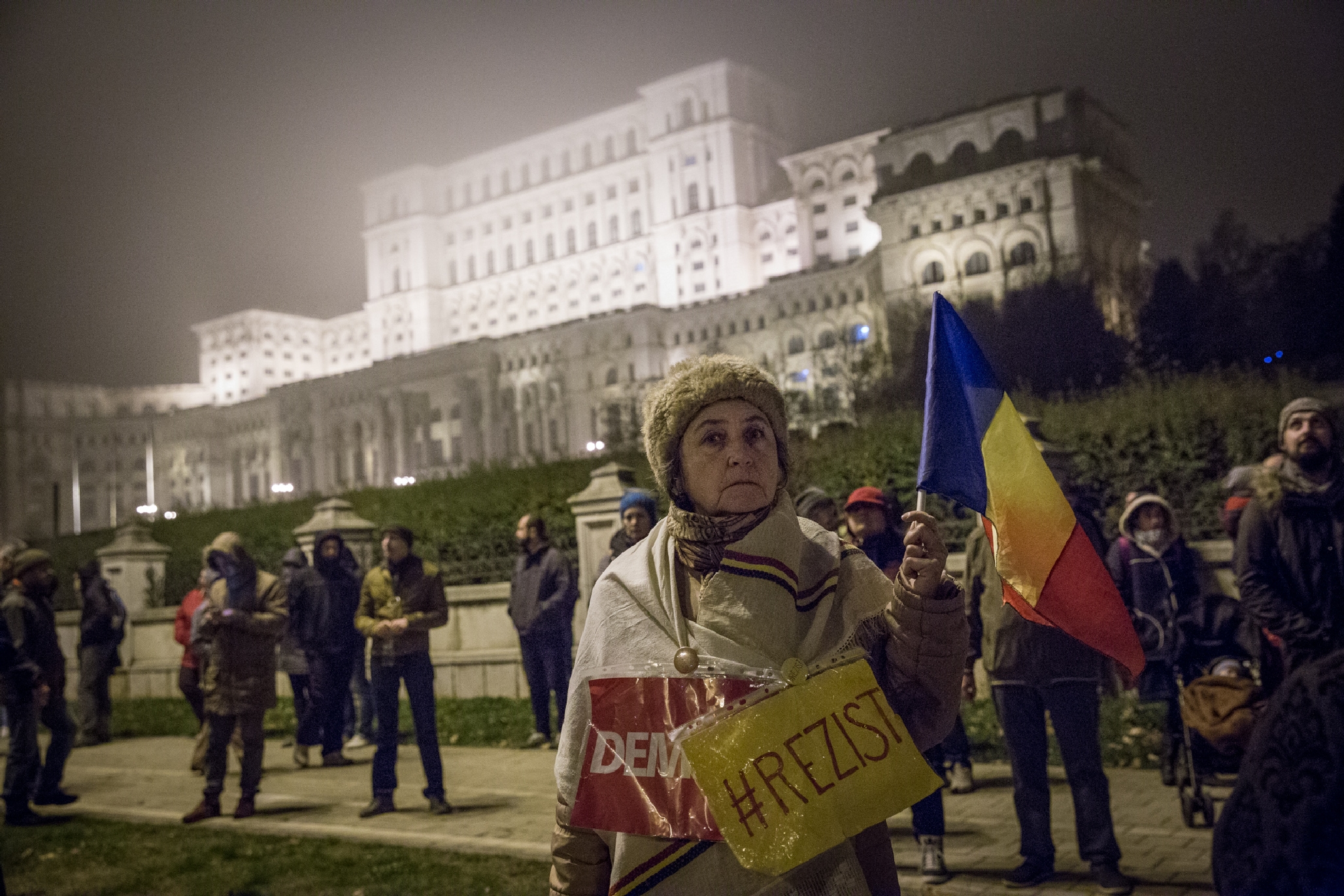
The thousands who turn up late that evening in temperatures of 19 degrees Fahrenheit are a diverse group. Most are over 35 years old, people with entrepreneurial or professional careers. They are jurists, IT professionals, advertisers, artists, academics, operations and logistics specialists, trainers and designers, and NGO activists.
They have left their children at home tonight, with spouses or parents, to defend values they first heard about in their childhood 30 years ago, on Voice of America or Radio Free Europe: Democracy, rule of law, an independent judiciary, and a battle against corruption.
With no coordination, many of them decide to go to Bucharest’s Victory Square – where government offices are located.
The people here are all-in. They are angry, too. But they don't know what to do. They don't want violence. They shout in front of Victoria Palace.
Over the last 150 years, the cultural and political history of Romania has been fueled by an aspiration to synchronize – socially and politically – with Western societies.
The civic movements that have arisen here in the last three years are just another step in this trend. It's part of a process that rejects political authoritarianism and privilege (immunity, concealed pardons, special pensions) and affirms the rule of law.
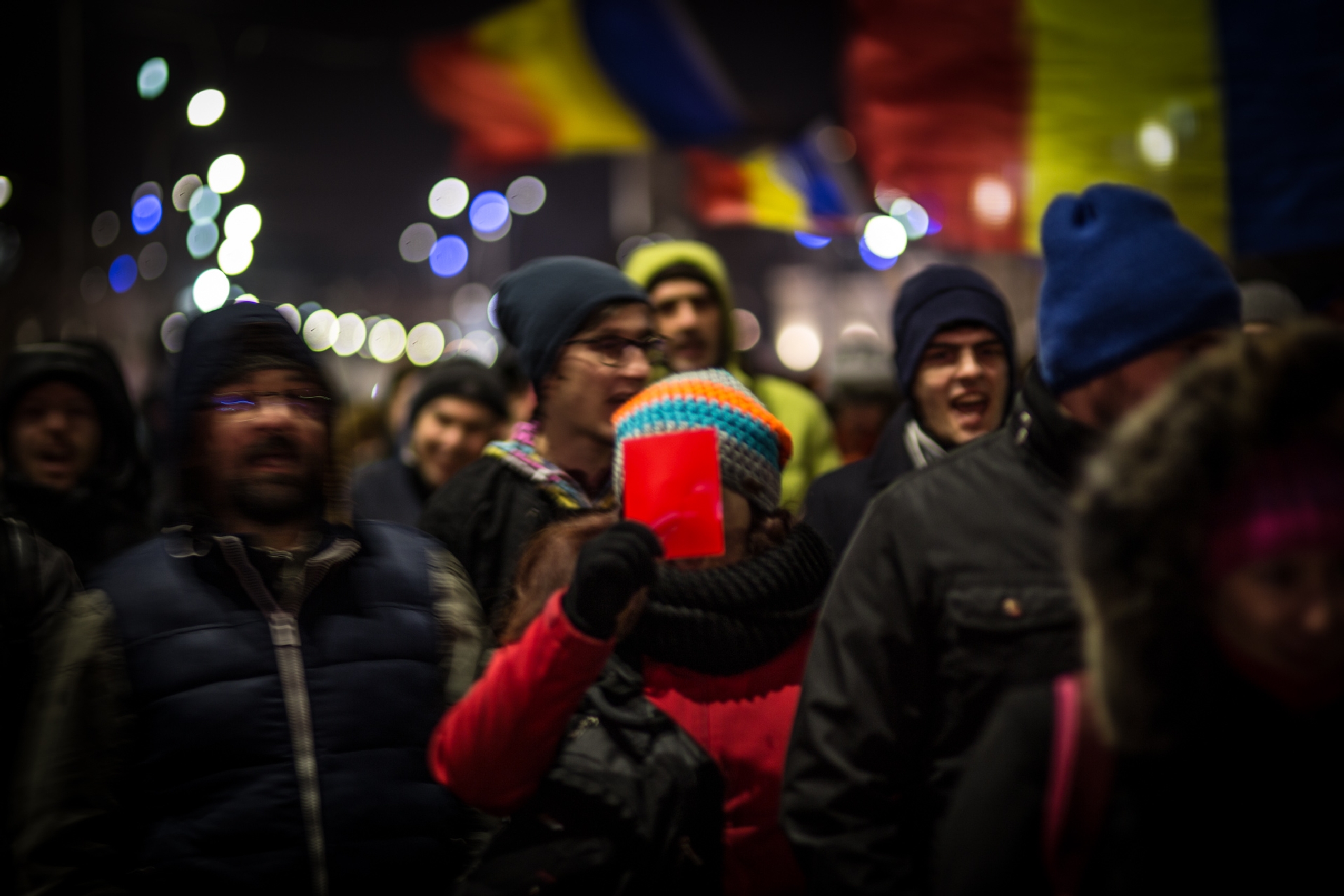
But people also came out on the streets in January 2017 because of their personal experiences.
There is Mihai, who viscerally remembers his hunger as a child during the Nicolae Ceaușescu regime, which ended in violence in 1989. He is a generous philanthropist who owns an IT company employing 100 people, but he still feels guilty when he spends more than $20 on lunch.
My 65-year-old father and his 80-year-old teacher are here as well. They came from a rural community where many people were persecuted in the 1950s. Their fathers hid for years to escape signing away their land to kolkhoz-style cooperatives.
The people here are all-in. They are angry, too. But they don't know what to do. They don't want violence. They shout in front of Victoria Palace.
My story? My mother worked as a nurse in a hospital in the Ceaușescu years, tending to the victims of illegal abortions. There were were countless such abortions in that era, provoking tens of thousands of women’s deaths and hundreds of thousands of hysterectomies. The reason? Contraception was strictly forbidden by the state and punished by prison terms. The women had forced OB-GYN exams at their workplace, to make sure all the early pregnancies were recorded.
I hate authoritarianism. Not from books, but from the heart of a 7-year-old child who saw his young mother crying, besieged with immense sadness for every woman she witnessed die on the operating table.
January 31st, 2017 was the beginning of a lasting citizenship development process, which is still in progress right now.
August 10th, 2018: The Diaspora Returns
The 2017 protests – in which more than 600,000 protesters took to the streets in all the major cities of Romania – eventually led to a repeal of the emergency ordinances.
Yet the tug of war continued. Dragnea and the PSD intensified their attack on the rule of law – using their parliamentary majority, or in a Constitutional Court packed with loyal judges. They took aim at chief prosecutor of the National Anticorruption Directorate, Mrs. Codruta Kovesi, and then Romania's General Attorney, Mr. Augustin Lazar. They offered judges and prosecutors early retirement at the age of 45, with pensions that are 10 to 15 times larger than an average pension.
The PSD also passed new amendments to the criminal and procedural codes, making it harder for judges to convict those charged with corruption. Their attacks on the free press, the NGOs, civically-active citizens, and the intellectuals who are critical of the government turn more and more aggressive.
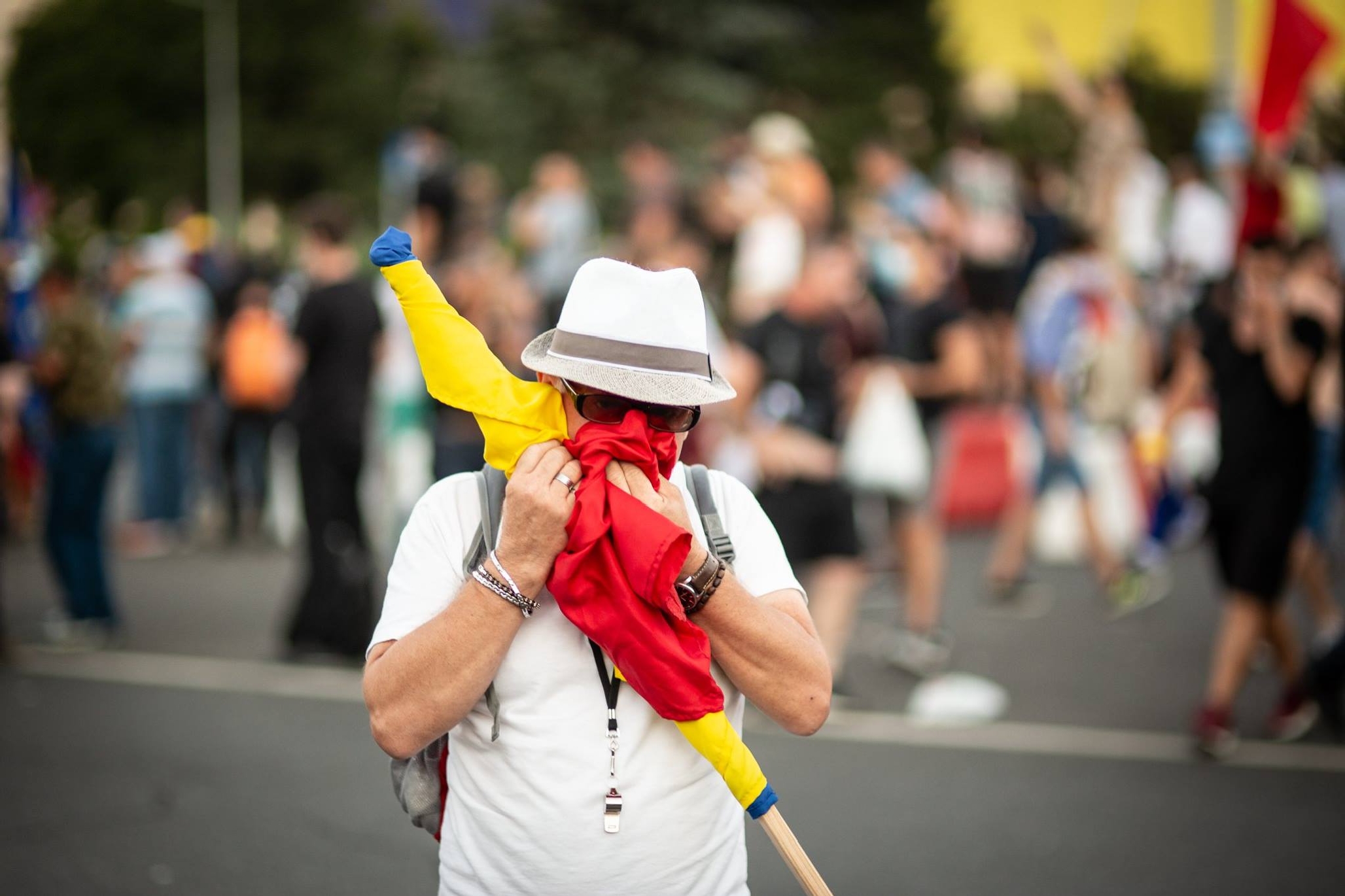
Attacks on the “parallel state” – a Romanian variant of the "deep state" concept – are a central part of Dragnea’s discourse. He even holds a pro-PSD rally in Victory Square, busing in tens of thousands of supporters from all over the country. Many did not want to participate, but were threatened with loss of their jobs or social benefits.
Dragnea attacked opponents of the regime at the rally, telling the crowd: “We are the white brigades! We'll clean the country of the filth spread by these rats!"
On the streets of the country, people are frightened. But the work of building civil society continues in dozens of massive rallies, and hundreds of daily protests, sit-ins, roadblocks, defiance acts, or artistic events. It is an ongoing civic effervescence, fueled by the creativity of private sector professionals, artists, and other citizens, using their tools of trade.
The stage was set for the opposition’s Diaspora Rally. On August 10, 2018, Romanians came home to show their support for reform.
Romania’s diaspora is enormous. Since the early 2000s, at least 4 million Romanians (out of a population of 22 million) have emigrated, most of them to the Western countries of the European Union.
This emigration approaches roughly 25 percent of the active population, but poor regions have seen population losses of more than 35 to 40 percent or young or middle-aged citizens. In percentage terms, it is the largest worldwide emigration during peacetime in the last century.
On August 10, 2018, Romanians came home to show their support for reform.
On August 10th, in Victory Square, 120,000 people turn up at the largest rally since February 2017. The mood is excellent. It is hot, but people are smiling. Many meet up with old friends, some of them who left the country a long time ago.
The civil society movement has launched an initiative to amend the Constitution: "No Convicted Criminals in Public Office." We need at least 500,000 signatures. So we work the rally to find them. My teammates are Diana and Marian.
Diana created an online application for scheduling blood donors. Every month, thousands of donors use it to find out where the blood is needed. Blood shortage is a chronic problem faced by the Romanian healthcare system. Marian works for a large company as a logistics manager. He is a one-man army, seemingly everywhere: organizing protests, negotiating with riot police, helping with charitable initiatives, and managing a citizen online TV channel called #RezistentaTV.
A young couple living in Spain sign the petition. The lady of the couple is visibly pregnant.
Precisely at that moment, around 4 p.m., Romanian riot police officers send a volley of tear gas grenades into the crowd with projectile launchers.
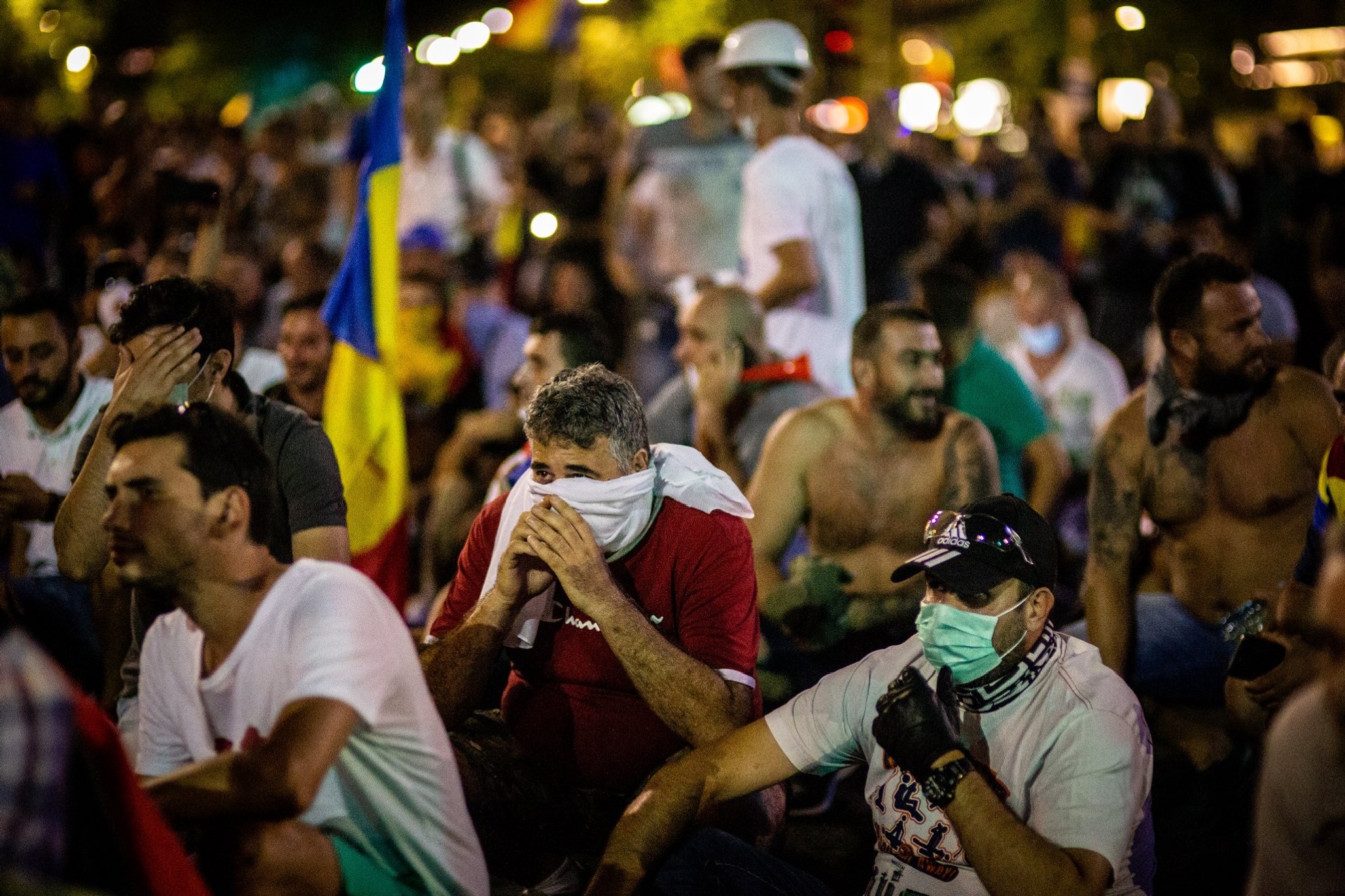
One grenade falls a few meters from the pregnant woman, releasing a dense cloud of toxic smoke. We run through the crowd, and then return a few minutes later to carry people choking in the gas, or blinded by it, to ambulances. Over 500 people request medical help in those hours.
Despite the peaceful nature of the rally, authorities grow rougher as the evening goes on. Just after 11 a.m., riot police move in. Squad cars block nearby streets. Officers – with their ID numbers covered by duct tape – use water cannons and nightsticks on peaceful protestors.
The scenes are shocking, and the violence is indiscriminate. Older people, parents with their children, and women are pushed, or sprayed in the face with tear gas. Over 500 protesters filed criminal complaints against the riot police for brutality and bodily harm.
The pretext for police violence was created for days before the rally on government television. They talk about stopping a "coup d'etat" – the same term used by Prime Minister Vasilica Viorica Dăncilă in a letter to the European Commission, justifying the violence.
Yet the next day, tens of thousands of people return to Victory Square. They are ruffled. Some are still sick from being tear-gassed. But they demonstrate peacefully.
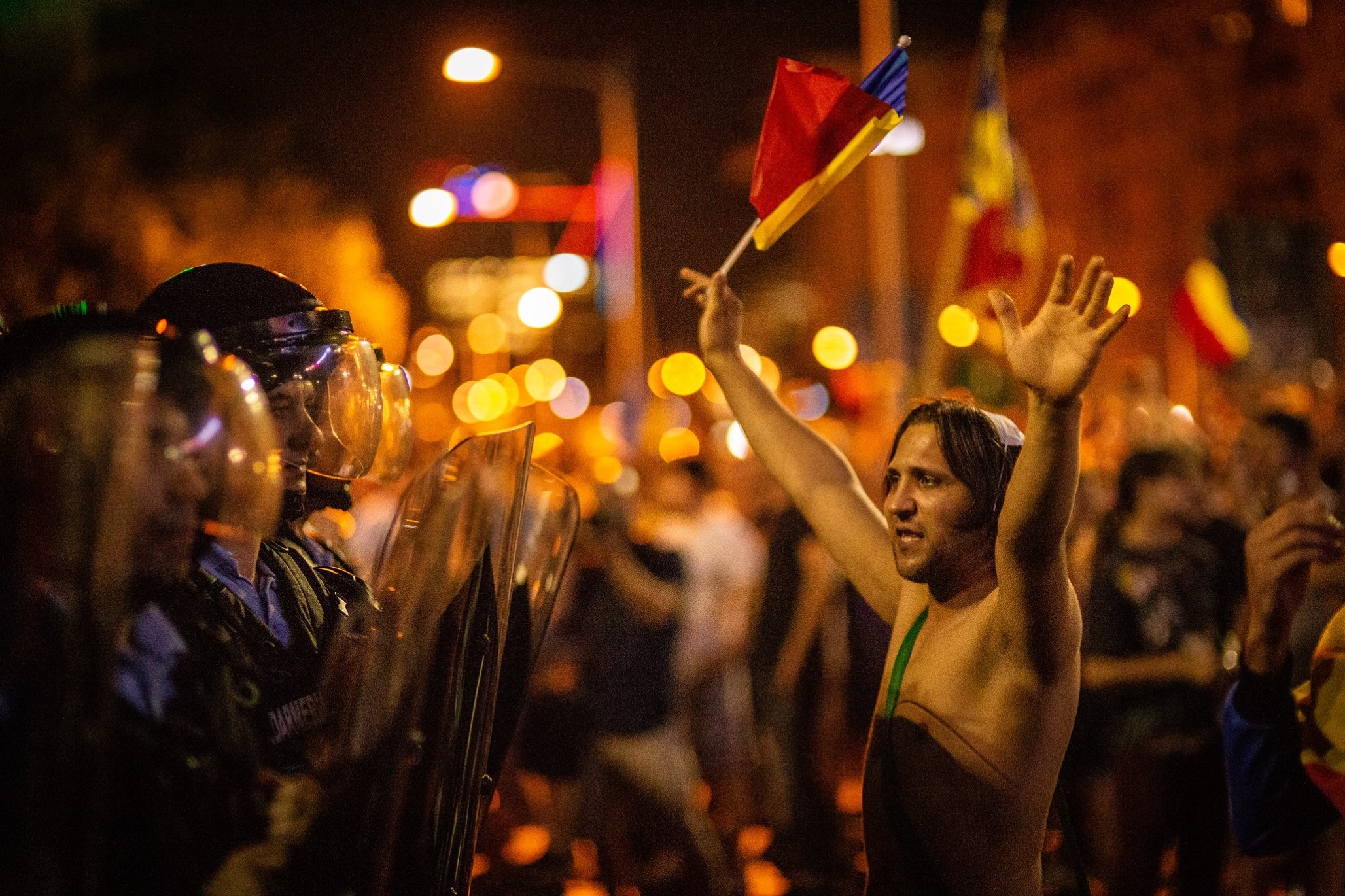
In the corner of the square, in front of a life-size plaster giraffe at the entrance of the Natural History Museum), stands Mihai Sora, a distinguished 102-year philosopher. He has marched with us through winter snows and summer heat, and he is here today, smiling quietly, encouraging the young marchers.
The Diaspora Rally and the violent police response were one of the moments along the way when the civic movement understood that patience was an essential quality of our protests.
Democracy takes time. We did not resort to brutal means to correct a situation we did not like, but stuck to our principles: persistence in nonpartisan nonviolence. We would triumph by having the patience required in trench warfare. Citizens understood that we were running a marathon, not a 100-meter sprint.
May 26th, 2019: Liberation
European Parliament elections happen today. The first elections in Romania since pro-justice protests began. A referendum for justice requested by the civil society movement is also on the ballot.
The first question concerned amnesty and pardons for crimes of corruption. A survey commissioned by Geeks for Democracy – the civic affinity group that I co-founded to support other civic groups – put the numbers against such pardons at 91 percent. The second question prohibits the use of emergency ordinances in the judicial system that started the protests over two years before.
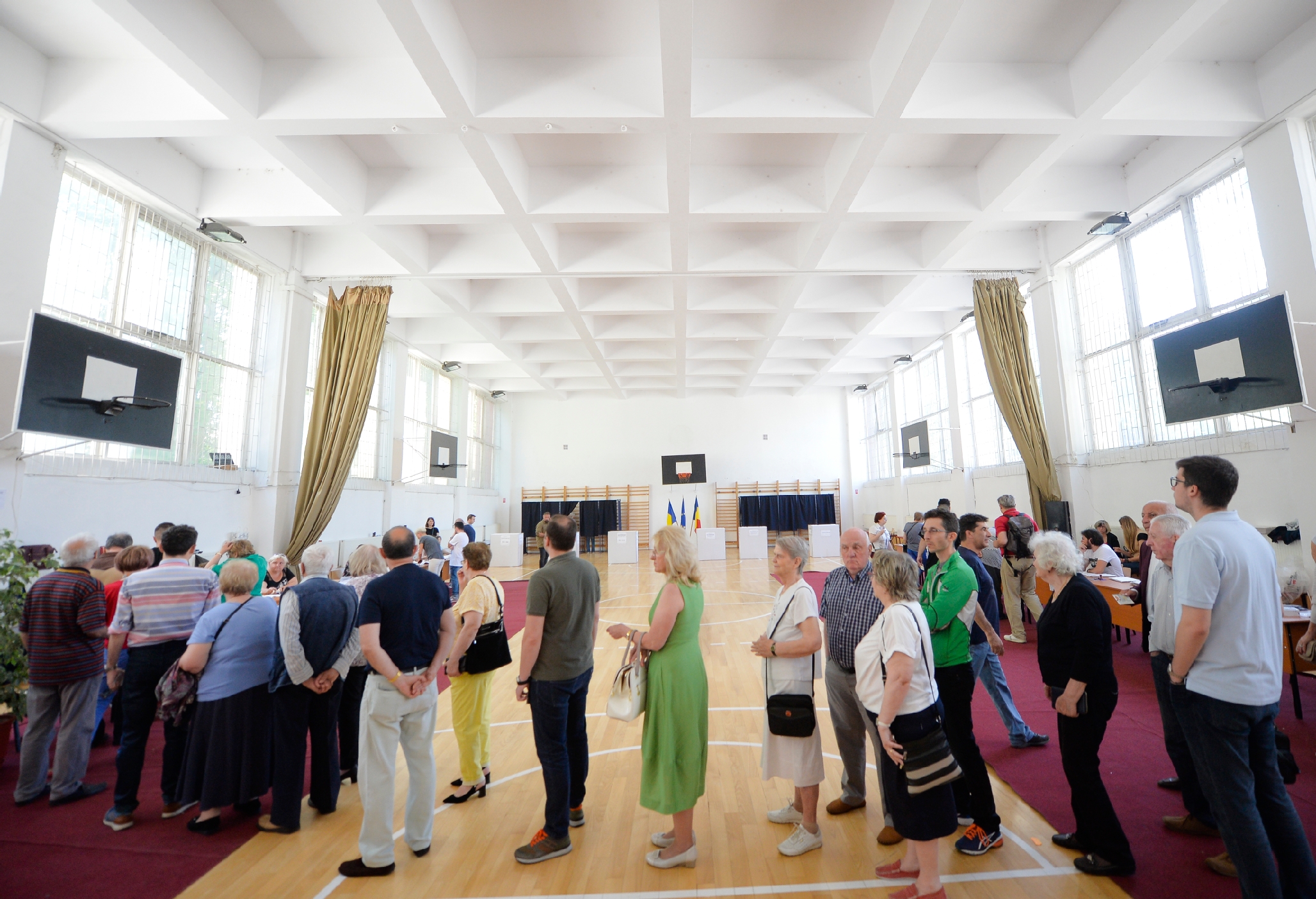
Election day is hectic. Together with some friends, I am coordinating the election observation initiative – Each Vote Matters. There is a positive atmosphere in the Each Vote Matters call center. People are coming to vote in large numbers – a much higher turnout than in previous European Parliamentary elections.
The PSD knows they cannot defeat the referendum, so the party asks its supporters to boycott the referendum for justice as a tactical maneuver. A referendum is not valid if less than 30 percent of the electorate casts a ballot.
At the call center, phones from voting centers in the diaspora start to ring. Romanian citizens abroad are in line for hours, waiting to vote. But the number of polling stations are insufficient for the multitude of Romanian citizens in other nations. Many give up after waiting for hours. One my colleagues later estimated that at least 100,000 Romanians residing in other European countries were unable to vote due to the poor organization by the nation’s Foreign Ministry.
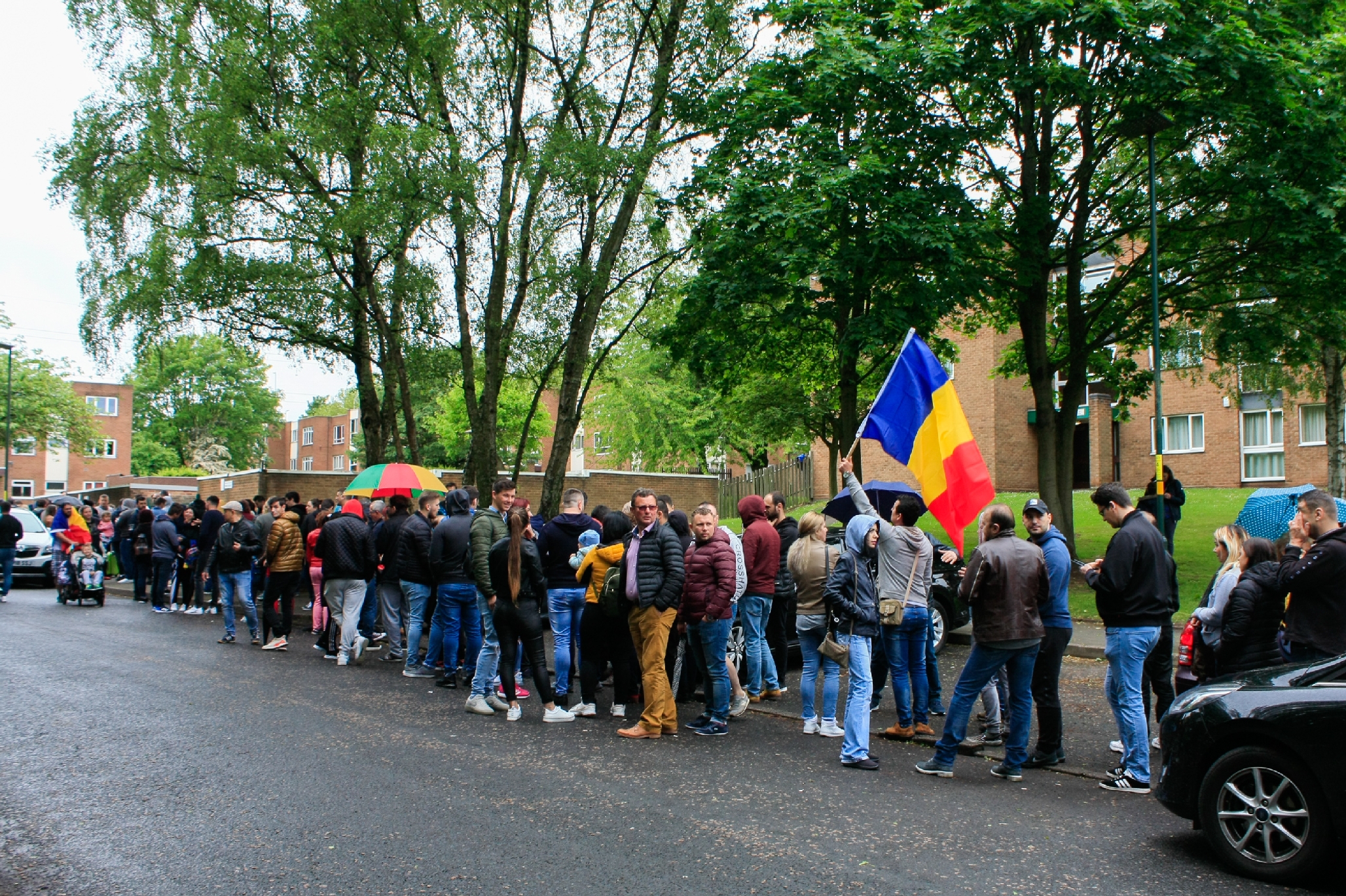
Among the electoral observers that day are Mihai Sora, the 102-year-old philosopher, and his wife. We thought their presence would be a symbolic act of solidarity. We were wrong. They stayed for the entire day, many hours in a row, and visited many polling stations.
At the end of the day, exit polls make it clear that democracy and the rule of law, European values, and an independent system of justice have won decisively. Parties that oppose the PSD party have won almost two-thirds of the European Parliament seats. The referendum passes, too, with over 80 percent of voters weighing in.
Yet something strange is happening in Victory Square. There are not as many people celebrating as you might expect. Many are still busy in polling stations, counting votes, or as independent electoral observers or party delegates. The celebration will take place the next day.
Citizens understood that we were running a marathon, not a 100-meter sprint.
Coincidentally, there was a ruling on an appeal made by Dragnea on the very same day as the nation celebrates. He was convicted in June 2018 of placing two employees working for the PSD as phony workers at the Department for Child Protection. The conviction – and his three-and-a-half-year sentence – are upheld. He goes to prison that day.
It is a double joy. Waves of happiness on Facebook. Countless jokes. Relief that the politician who has wrecked our sleep and our peace of mind for the past two years received his just punishment. We had allowed justice to do justice in the end.
Two years prior to this moment, our movement was a minority in a country that had voted overwhelmingly for Dragnea's party. But on May 27th, 2019, there was a civic fiesta in Victory Square. The first party after over a hundred protests.
It is strange, but it seemed to me that we were somehow more prepared to do battle than have fun and enjoy a victory. We knew pain together, but had no idea how to enjoy a victory.
The Path Forward
Since November 2019, Romania exists in a precarious political equilibrium. The current government does not have a majority in Parliament. The National Liberal Party holds about 20 percent seats in Parliament. It is backed by a heterogeneous coalition. Local and parliamentary elections that will define the direction the country are still to come.
Active citizens realize that we are only halfway there. The acute phase of the illiberal attack has passed; however, there is no guarantee that it cannot return in another form. The PSD still boasts a high-performing electoral machine and skilled politicians. They can mobilize around 3 million votes through the intervention of mayors and local party bosses.
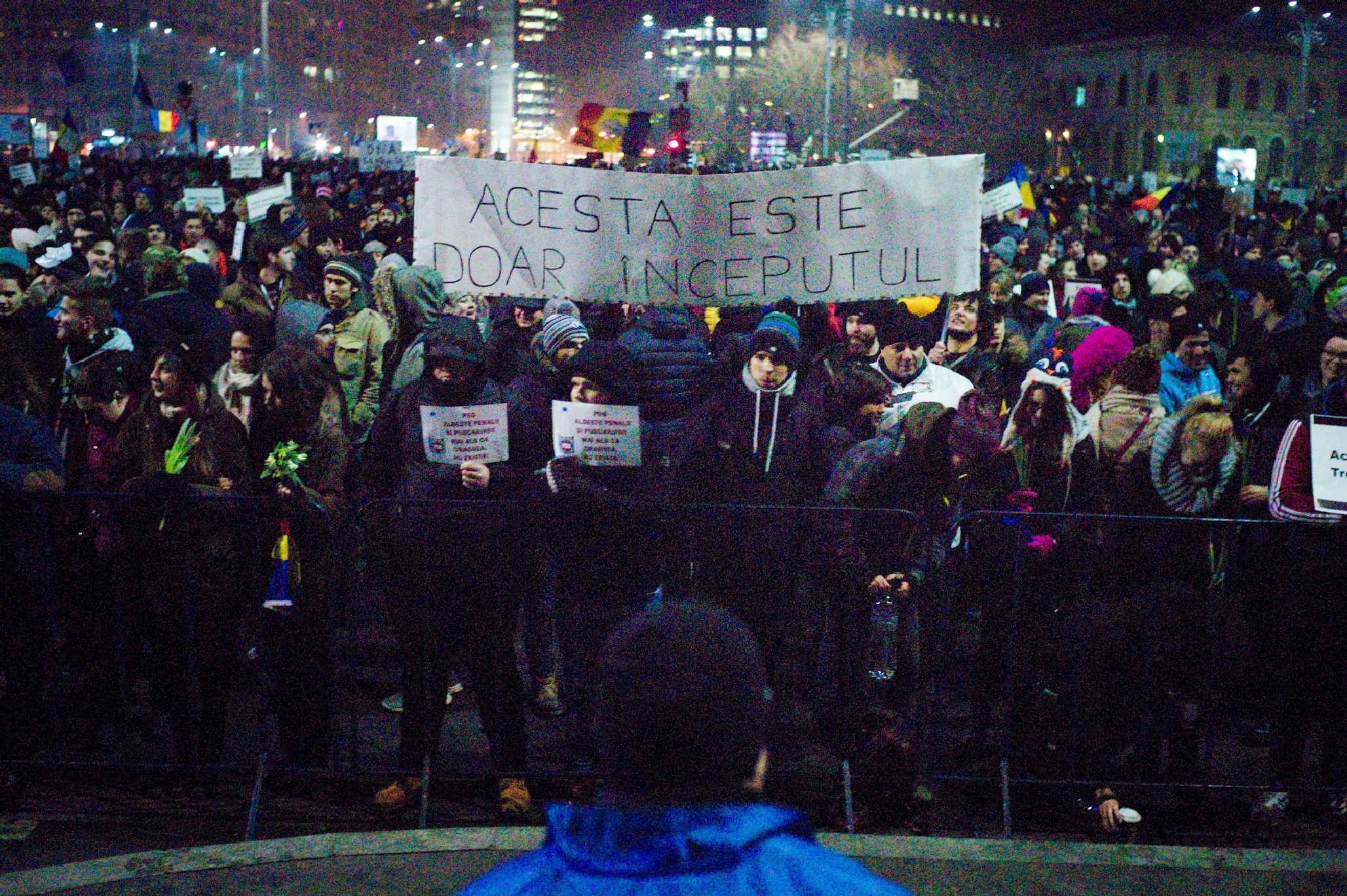
The only way to defeat the PSD is massive turnout. PSD wins elections when the turnout is 35 percent; at 50 percent, they lose. It is that simple.
So democratic reform is sustainable if and only if the categories of citizens who have long been silent (young people, urban professionals) decide to participate in public life. The trends are good at present. Many young people have chosen to join civic parties, and even run for office.
We were somehow more prepared to do battle than have fun and enjoy a victory. We knew pain together, but had no idea how to enjoy a victory.
For almost three years, the story of Romanian democracy has been one of resistance. The protests made me believe that Romanian society has acquired its dose of resilience. It can self-organize without professional organizers; it can confront firmly, but also with humor, the assaults on democratic values.
Now, we are about to enter a new narrative.
It is a narrative of change. But it also is a story of how Romanians will build efficient mechanisms to curb what they have just voted out: political assaults on fundamental values such as democracy, equality before the law, fairness and the rule of law.
Cătălin Tenită lives in Bucharest and works as a digital entrepreneur. He is a civically-involved citizen, including his role as co-founder of Geeks for Democracy – an affinity group for people willing to uphold the rule of law, equity, and nonviolent change in Romania using their professional skills. Tenită is a 2020 Eisenhower Fellow.
Cover Photograph: Protests in Bucharest, December 2017. (Stefan Voinea)
